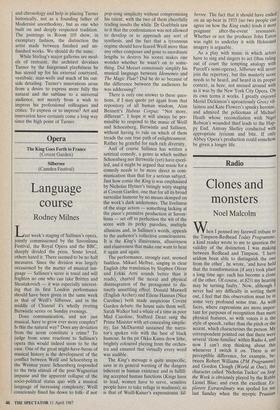Opera
Silbersee (Camden Festival)
Language course
Rodney Milnes
Last week's staging of Sallinen's opera, jointly commissioned by the Savonlinna Festival, the Royal Opera and the BBC, sharply divided the press. Some loved, others hated it. There seemed to be no half measures. Since the division was largely occasioned by the matter of musical lan- guage — Sallinen's score is tonal and will frighten no one who can take Britten and Shostakovich — it was especially interest- ing that its first London performance should have been given in the same week as that of Weill's Silbersee, and in the middle of Channel 4's wholly riveting Birtwistle series on Sunday evenings.
Does communication, and not just musical, have to grow ever more complex? Is this the natural way? Does any deviation from the norm constitute a crime? To judge from some reactions to Sallinen's opera this would indeed seem to be the case. One of the great might-have-beens of musical history is the development of the conflict between Weill and Schoenberg in the Weimar years: Schoenberg responded to the twin stimuli of the post-Wagnerian impasse and the apparent collapse of the socio-political status quo with a musical language of increasing complexity; Weill consciously fined his down to folk- if not pop-song simplicity without compromising his talent, with the two of them cheerfully trading insults the while. Dr Goebbels saw to it that the confrontation was not allowed to develop or to approach any sort of synthesis, and the fact that a tyrannous regime should have feared Weill more than any other composer and gone to inordinate lengths to destroy his scores makes one wonder whether he wasn't on to some- thing. Did Mozart consciously simplify his musical language between Idomeneo and The Magic Flute? Did he do so because of the difference between the audiences he was addressing?
There is only one answer to these ques- tions, if I may quote yet again from that repository of all human wisdom, Alan Bennett's Habeas Corpus: "Not more, different". I hope it will always be per- missible to respond to the music of Weill and Schoenberg, Birtwistle and Sallinen, without having to rule on which of them treads the one true path of enlightenment. Rather be grateful for such rich diversity.
And of course Sallinen has written a satirical comedy, a genre in which neither Schoenberg nor Birtwistle (yet) have excel- led, and it might be argued that music for a comedy needs to be more direct in com- munication than that for a serious subject. Just how comic the King is was emphasised by Nicholas Hytner's bitingly witty staging at Covent Garden, one that for all its broad surrealist humour by no means skimped on the work's dark undertones. The liveliness of the stage action — something lacking at the piece's premiere production at Savon- linna — set off to perfection the wit of the score with its perky parodies, multiple allusions and, in Sallinen's words, appeals to the audience's collective consciousness. It b the King's illusiveness, allusiveness and elusiveness that make one want to hear it again and again.
The performance, strongly cast, seemed faultless. Mikael Melbye, singing in clear English (the translation by Stephen Oliver and Erkki Arni sounds better than it reads), charted the moral and physical disintegration of the protagonist to dis- tinctly unsettling effect. Donald Maxwell (English Archer) and Eilene Hannan (Nice Caroline) both made auspicious Covent Garden debuts: the house suits them well. Sarah Walker had a whale of a time as poor Mad Caroline; Stafford Dean sang the Prime Minister with art-concealing simplic- ity; Ian McDiarmid sustained the narra- tor's spoken role with the best of black humour. In the pit Okko Kamu drew lithe, brightly coloured playing from the orches- tra and ensured that virtually every word was audible.
The King's message is quite unspecific, save in its general warning of the dangers inherent in human existence and in fulfill- ing accepted human functions (Kings have to lead, women have to serve, sensitive people have to take refuge in madness); so is that of Weill-Kaiser's expressionist Si/- bersee. The fact that it should have ended on an up-beat in 1933 (no two people can agree on how the King ends) lends it most poignant after-the-event resonance. Whether or not the producer John Eaton was right to underlay it with Holocaust imagery is arguable. As a play with music in which actors have to sing and singers to act (thus ruling out of court the tempting analogy with Purcell's semi-operas), Silbersee will never join the repertory, but this masterly score needs to be heard, and heard in its proper context, as here, not messed around with as it was by the New York City Opera. On its own terms it works. I greatly enjoyed Meriel Dickinson's uproariously Grosz vil- lainess and Kate Flowers's spunky heroine, and admired the policeman of Michael Heath whose reconciliation with Nigel Robson's wounded thief leads to the Hap- py End. Antony Shelley conducted with appropriate lyricism and bite. If only Abbey Opera's production could somehow be given a longer life.
























































 Previous page
Previous page